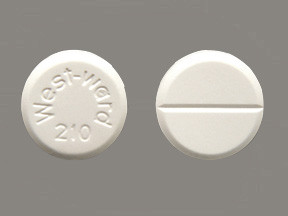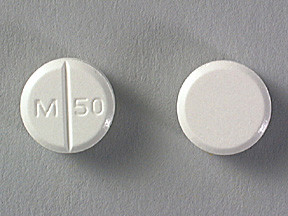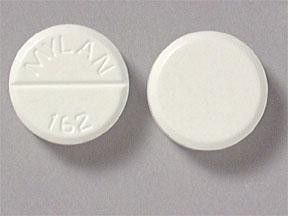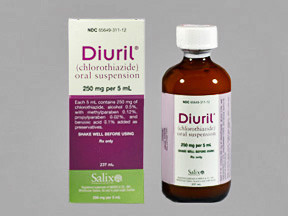CHLOROTHIAZIDE - ORAL
PHONETIC PRONUNCIATION: (KLOR-oh-THYE-a-zide)
COMMON BRAND NAME(S): Diuril
GENERIC NAME(S): chlorothiazide
Uses
USES: This medication is used to treat high blood pressure. Lowering high blood pressure helps prevent strokes, heart attacks, and kidney problems. Chlorothiazide is a "water pill" (diuretic) that causes you to make more urine. This helps your body get rid of extra salt and water. This medication is also used to decrease swelling (edema) caused by conditions such as cancer, congestive heart failure, liver disease, and kidney disease. This effect can help your kidneys work better and lessen symptoms such as trouble breathing and swelling in your ankles, feet, hands, or belly.
How to use CHLOROTHIAZIDE - ORAL
HOW TO USE: Take this medication by mouth with or without food as directed by your doctor, usually once or twice a day. If you take this drug too close to bedtime, you may need to wake up to urinate. It is best to take this medication at least 4 hours before your bedtime. If you are using the liquid form of this medication, carefully measure the dose using a special measuring device/spoon. Do not use a household spoon because you may not get the correct dose. Shake the bottle well before each dose. The dosage is based on your medical condition and response to treatment. In children, the dosage is also based on age and weight. Use this medication regularly to get the most benefit from it. To help you remember, take it at the same time(s) each day. Keep taking this medication even if you feel well. Most people with high blood pressure do not feel sick. Cholestyramine and colestipol can decrease the absorption of chlorothiazide. If you are taking either of these drugs, take them at least 4 hours before or after taking chlorothiazide. Tell your doctor if your condition does not get better or if it gets worse (your blood pressure readings remain high or increase).
Side Effects
Precautions
Interactions
Overdose
Images

- color
- white
- shape
- round
- imprint
- West-ward 210
Reviews
Faq for CHLOROTHIAZIDE - ORAL
Chlorothiazide is a medication that belongs to a class of drugs known as diuretics. It is used to treat conditions such as high blood pressure, edema (fluid retention), and kidney problems.
Chlorothiazide works by increasing the amount of urine produced by the kidneys, thereby helping to remove excess water and salt from the body. This reduces fluid build-up and helps lower blood pressure.
Common side effects of chlorothiazide may include increased urination, dizziness, headache, upset stomach, diarrhea, and blurred vision. It is important to contact a healthcare professional if these side effects persist or worsen.
Chlorothiazide is usually taken by mouth once daily in the morning or as directed by your doctor. It is essential to take the medication exactly as prescribed and to follow any dietary or fluid restrictions advised by your healthcare provider.
Yes, chlorothiazide can interact with other medications, including certain antibiotics, nonsteroidal anti-inflammatory drugs (NSAIDs), other diuretics, and certain medications for diabetes or gout. It is important to inform your doctor or pharmacist about all the medications you are taking to avoid potential drug interactions.
The onset of action with chlorothiazide can vary, but its diuretic effects are usually seen within 2 hours of taking the medication. However, it may take several weeks for the full benefit to be achieved.
Chlorothiazide should only be used during pregnancy if clearly needed and under the guidance of a healthcare professional. It is generally not recommended during breastfeeding as it can pass into breast milk and may harm the nursing infant.
It is generally recommended to avoid alcohol consumption while taking chlorothiazide as it can increase the risk of certain side effects such as dizziness or lightheadedness.
If you miss a dose of chlorothiazide, take it as soon as you remember. However, if it is close to your next scheduled dose, skip the missed dose and resume your regular dosing schedule. Do not double the dose to make up for a missed one.
Disclaimer
IMPORTANT: HOW TO USE THIS INFORMATION: This is a summary and does NOT have all possible information about this product. This information does not assure that this product is safe, effective, or appropriate for you. This information is not individual medical advice and does not substitute for the advice of your health care professional. Always ask your health care professional for complete information about this product and your specific health needs.



No Reviews Yet